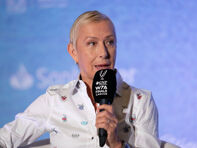It’s often easy to forget that heroes are human. After all, they do the impossible. They walk on the moon. They lead revolutionary wars. They usher in eras of Civil Rights struggles.
They show the world in the 1970s that women don’t simply belong in the kitchen.
To be sure, that’s the hook of the film “Battle of the Sexes,” which tells the story of the famous primetime tennis match between Billie Jean King and Bobby Riggs. The match was supposed to show the utter dominance of men over women and once-and-for-all put to rest the idea that any female athlete should earn pay equal to that of her male counterpart.
Of course, it didn’t quite work out that way.
Yet it’s not the historic nature of the moment — broadcast in primetime on ABC — that makes the film soar, but rather the look inside the hearts and minds of these two very human beings — King and Riggs — who will forever be connected in history.
All great sports films succeed at placing humanity ahead of the sport they portray. “Field of Dreams.” “Remember The Titans.” “Hoosiers.” “Million Dollar Baby.” Now “Battle of the Sexes” knocks this out of the park. We are presented with two people each struggling to correct mistreatment for who they are: King for being a woman, and Riggs for being a high-stakes gambler.
It’s handling the latter that the film succeeds beyond all expectations. Riggs is not the villain in the film, he is the anti-hero, the down-on-his-luck guy just trying to find his way back into the headlines. He is, just like King, fighting for the right to be who he is, even giving a sermon on the wonders of his gambling addiction.
It’s the male sports institution, embodied by male-chauvinist tennis promoter Jack Kramer, that garners the much-deserved villain monicker in the film. The handling of Riggs as an affable yuckster, despite making wildly outrageous, sexist comments, was a powerful choice by the film’s directors and writers. That King is at times shown smiling and laughing along with the Riggs circus both reflects the reality of history and empowers her competitive character as someone who can shake your hand while kicking your ass.
King is equally developed not just as a paper-cut-out hero, but rather a woman struggling to balance her true self with her public persona, a lesbian trapped in the role of a 1970s icon. The scenes with her husband, Larry King, offer a powerful insight into the struggles that opposite-sex couples have when one of the two people has been pushed by society to mask who they really are. King’s battles for equal treatment of gay people came years after the era covered in the film, yet we get glimpses into the seeds of King’s emergence as a lesbian and an LGBT pioneer.
When King and Riggs finally take the court in front of a worldwide TV audience of 90 million people, it is a contrast of styles. Riggs had already taken down then-No. 1 Margaret Court, 6-2, 6-1, so most of the world assumed Riggs would dominate King, even wearing an uncomfortable jacket from sponsor Sugar Daddy. The tennis isn’t the most scintillating sports action we’ve seen on film, but the drama of the moment breathes life into the match.
The outcome isn’t difficult to predict. Everyone has heard of Billie Jean King; Outside of this match, few today know Bobby Riggs.
After watching ‘Battle of the Sexes,’ we all know these two characters a little bit better. While creative license was certainly applied to the film, by many accounts the stories and human struggles stuck to life’s script really well. I won’t be surprised if the film garners a bunch of talk during awards season. As far as sports films go, this one ranks way up there with some of the best.





































